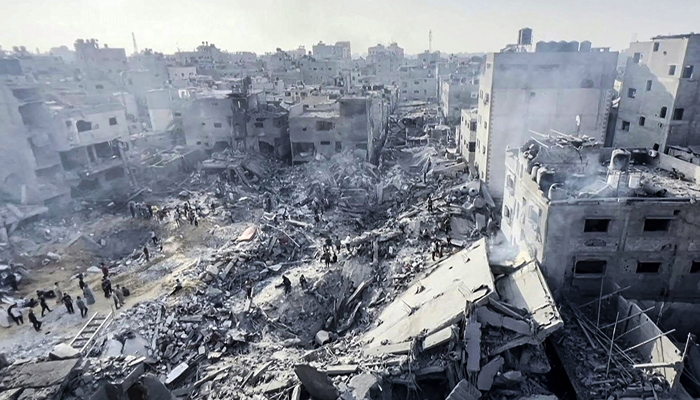Impunity report
This year’s International Day to End Impunity for Crimes against Journalists (which falls every year on November 2) comes as the world witnesses an open targeting of journalists in Gaza by the violent Israeli regime. In times of such crises, journalists are targeted specifically for the job they do: collect, investigate, disseminate information. This is what is happening in the Gaza Strip right now, a place that is today the most dangerous in the world for children, journalists and aid workers. The annual Global Impunity Index published by the Committee to Protect Journalists (CPJ) says that between 2012 which was the year the UN designated Nov 2 as the International Day to End Impunity for Crimes against Journalists and August 2023, around 261 journalists have been killed in the line of duty. In nearly 80 per cent of these cases, no one has been held accountable. This is a glaring reflection of the impunity there is for crimes against journalists.
Pakistan has often been described as one of the most dangerous places in the world for journalists. According to a report titled ‘Annual Impunity 2023’ released by the Freedom Network, Pakistan has consistently failed to protect its journalists against the rise in crimes against them. At least 42 journalists have been killed in Pakistan in the last four years. Pakistani journalists routinely receive death threats from ‘unknown’ people for their reporting. The situation today has not been better even though on the legislation front the government has made quite a few changes. The Sindh government was first to introduce safety laws for journalists and was followed by the federal government that passed the laws in late 2021. Though one positive impact of these laws was the improvement shown in the Reporters Without Borders' World Press Freedom Index ranking – Pakistan ranks 150 out of 180 countries (it used to rank 157) – not much has changed for journalists who continue being kidnapped, 'disappeared', arrested, and slapped with a series of legal cases.
This is a global issue, as highlighted by today's reports and events across the world and also what is going on in Gaza where more than 30 journalists have been killed, and at least two journalists have lost members of their families in what can be seen as a revenge attack by Israel against their reporting. Just next door in India we recently saw how the Indian government went after journalists that do not parrot the government’s line without verification. This does not sit well with the Modi government that sees reports on its competence as an attack and responds with vengeance. Until governments start respecting the role journalism plays in such trying circumstances, journalists around the world will continue to pay the ultimate price for doing their jobs. A free press is vital to the healthy functioning of any democracy but in the world we live in the concept of freedom of the media exists more in the abstract than in reality. The task for journalists now is to carve out a space for themselves where they can continue their job of holding the powerful accountable and informing the public. But they cannot do this while fielding airstrikes, or state violence, or arbitrary arrests, or enforced disappearances.
-
 Kate Middleton, Prince William Share Message Ahead Of Major Clash
Kate Middleton, Prince William Share Message Ahead Of Major Clash -
 Is Dark Matter Real? New Theory Proposes It Could Be Gravity Behaving Strangely
Is Dark Matter Real? New Theory Proposes It Could Be Gravity Behaving Strangely -
 Viral AI Caricature Trend: Is Your Personal Data Really Safe?
Viral AI Caricature Trend: Is Your Personal Data Really Safe? -
 Lil Jon’s Late Son, Nathan Smith Spoke Highly Of His Father Before His Tragic Death
Lil Jon’s Late Son, Nathan Smith Spoke Highly Of His Father Before His Tragic Death -
 China Boosts Reusable Spacecraft Capabilities By Launching For The Fourth Time
China Boosts Reusable Spacecraft Capabilities By Launching For The Fourth Time -
 Bianca Censori On Achieving 'visibility Without Speech': 'I Don't Want To Brag'
Bianca Censori On Achieving 'visibility Without Speech': 'I Don't Want To Brag' -
 'Concerned' Prince Harry Future Plans For Lilibet, Archie Exposed
'Concerned' Prince Harry Future Plans For Lilibet, Archie Exposed -
 Skipping Breakfast? Here Are Some Reasons Why You Shouldn't
Skipping Breakfast? Here Are Some Reasons Why You Shouldn't -
 Billie Eilish Slammed For Making Political Speech At Grammys
Billie Eilish Slammed For Making Political Speech At Grammys -
 Beverley Callard Announces Her Cancer Diagnosis: 'Quite Nervous'
Beverley Callard Announces Her Cancer Diagnosis: 'Quite Nervous' -
 WhatsApp May Add Instagram Style Close Friends For Status Updates
WhatsApp May Add Instagram Style Close Friends For Status Updates -
 Winter Olympics Officially Open In Milan, Cortina With Historic Dual Cauldron Lighting
Winter Olympics Officially Open In Milan, Cortina With Historic Dual Cauldron Lighting -
 Sciences Reveals Shocking Body Response Against Heart Attack
Sciences Reveals Shocking Body Response Against Heart Attack -
 Who Is Charlie Puth? Inside Awards, Hits & Journey Of Super Bowl Anthem Singer
Who Is Charlie Puth? Inside Awards, Hits & Journey Of Super Bowl Anthem Singer -
 Jared Leto 'swings For The Fences' In 'Master Of The Universe'?
Jared Leto 'swings For The Fences' In 'Master Of The Universe'? -
 Kelsea Ballerini, Chase Stokes Not On Same Page About Third Split: Deets
Kelsea Ballerini, Chase Stokes Not On Same Page About Third Split: Deets




